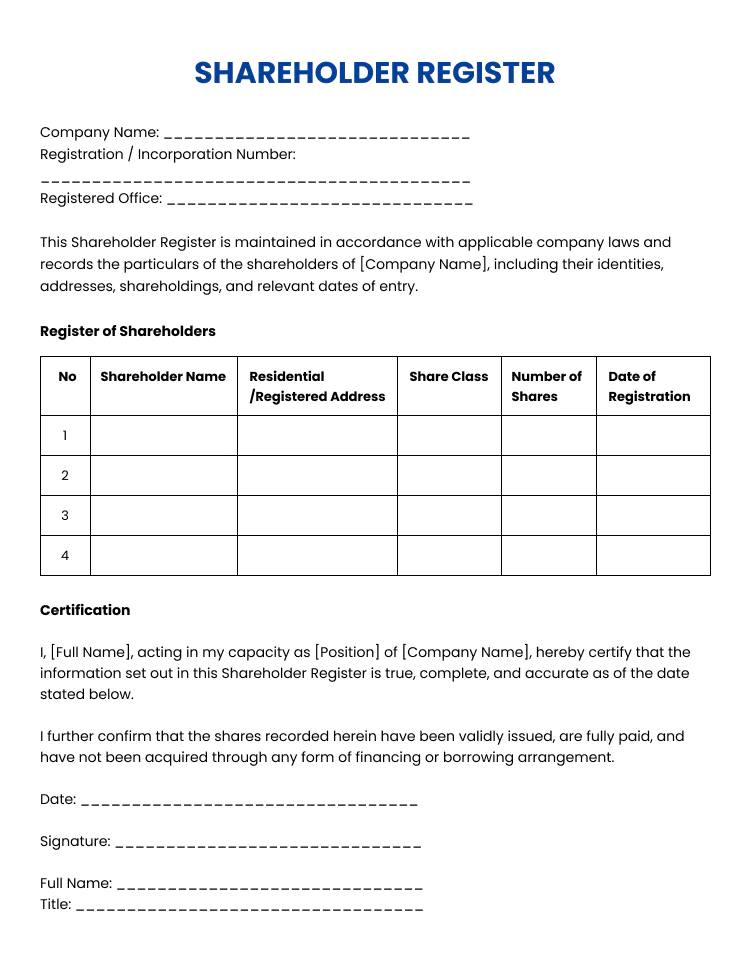
Table of Contents
Overview of UK shareholder register
The shareholder register is a legal document that records the details of individuals and entities that own shares in a UK company. This register includes essential information such as the names, addresses, and the number of shares held by each shareholder.
Legal requirements
In the UK, the Companies Act 2006 mandates that every company, whether public or private, must maintain an accurate register of shareholders. This register should be kept at the company’s registered office or another location notified to Companies House.
This duty falls squarely on the shoulders of the company’s officers, typically the company secretary or company directors. They are responsible for ensuring the register is kept up-to-date and available for inspection.
Importance of the register
The register of shareholders provides clarity on the ownership structure of a company, offering insight into who holds decision-making power and financial interests within the organization.
Shareholders, whether they hold a minority or majority stake, have certain rights and privileges, including voting rights and dividends. The register serves as a fundamental tool for exercising and protecting these rights.
What information is included in the shareholder register?
Let’s delve into what information you need to include in the register of shareholders:
- Name of shareholder: This is the legal name of the individual or entity that owns shares in the company.
- Shareholder’s address: The registered address of the shareholder is crucial for communication and legal notifications.
- Number of shares held: The register details the quantity of shares owned by each shareholder, specifying the class of shares if applicable.
- Date of entry: It’s important to record when a shareholder was added to the register to track changes over time.
- Shareholder’s rights: Any special rights attached to the shares, such as voting rights or entitlement to dividends, should be noted.
Need to update your shareholder register?
We provide legal admin service in the UK that helps you make changes with ease. Feel free to chat with our support team for practical advise on this matter.
How to create and maintain the shareholder register?
To create the register of shareholders, you’ll need to follow the steps below
Step 1: Gather shareholder’s information
Begin by gathering essential details for each shareholder in your company. This includes obtaining their full name, address, the number of shares they hold, the class of shares, and any other pertinent information.
Step 2: Draft the register template
In this step, you will need to put the shareholder’s information into the template. The template can be drafted electronically or in a physical format.
Many companies opt for electronic registers due to their ease of update and accessibility. You can also use specialized software or create a spreadsheet to organize the information.

Image: Sample of shareholder register template UK
After drafting the register, you have to immediately issue a share certificate to each shareholder listed in the register. This certificate serves as legal proof of share ownership, indicating the rights and responsibility of the shareholder.
Step 3: Sign the register
The register should be signed (wet-ink or e-sign) by an authorized officer of the company, such as a director or company secretary. The date of creation should also be noted. Before signing, ensure all the information is correct and up-to-date.
Step 4: Maintain the register
Once you have signed the register, make sure you maintain it at the company’s registered address or another designated location.
Maintaining the accuracy of the register of shareholders is an ongoing responsibility for company secretaries or those overseeing corporate governance.
Update changes to the register of shareholders
Any changes in share ownership, such as transfers, issuance, or buybacks, must be promptly recorded in the register, and updated with the Companies House in the UK by filing an annual confirmation statement.
This ensures that the information remains current and accurately reflects the company’s ownership structure.
Transfer of shares
When shares change hands, whether through sales, gifts, or transfers, these transactions must be promptly recorded in the register.
The shareholder wishing to transfer shares must notify the company in writing, specifying the details of the transfer.
The company then updates the register to reflect the new shareholder’s information, including their full name, address, and the number of shares transferred.
Issuance of shares
When a company decides to issue new shares, it must update the register to include information about the new shareholders.
The company specifies the number of shares issued, the class of shares, and the date of issuance for each new shareholder. This information is added to the register to reflect the expanded ownership structure of the company.
Share buybacks or redemption
In the event of share buybacks or redemptions, the company adjusts the register to reflect the reduced number of outstanding shares.
The company removes the shares from the register or updates the details accordingly to maintain accuracy.
Details such as the date of the buyback or redemption and the adjusted number of shares held by each shareholder are recorded in the register.
Conclusion
The shareholder register in the UK is a cornerstone of corporate governance, providing transparency, accountability, and legal compliance.
Understanding how to create and update this register is essential for company formation in the UK. By following the steps outlined in this guide, companies can accurately reflect their ownership structures and facilitate effective communication with shareholders.
Disclaimer: While BBCIncorp strives to make the information on this website as timely and accurate as possible, the information itself is for reference purposes only. You should not substitute the information provided in this article for competent legal advice. Feel free to contact BBCIncorp’s customer services for advice on your specific cases.
Industry News & Insights
Get helpful tips and info from our newsletter!
Stay in the know and be empowered with our strategic how-tos, resources, and guidelines.





